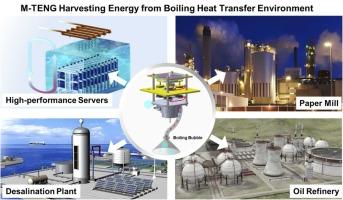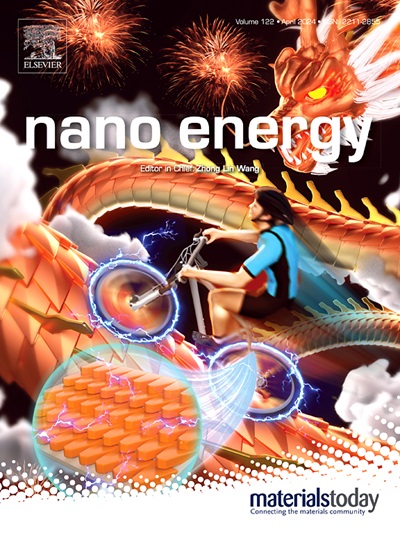Magnet Gear-based Triboelectric Nanogenerator Harvesting Energy from Boiling Heat Transfer Environment
IF 16.8
1区 材料科学
Q1 CHEMISTRY, PHYSICAL
引用次数: 0
Abstract
Boiling heat transfer has long been a promising thermal management technique across various industrial sectors. In the context of the energy crisis, recovering low-grade thermal energy from boiling environments is crucial for industrial advancement. Meanwhile, triboelectric nanogenerators (TENGs) are notable for low-grade energy harvesting due to their simple fabrication, adaptability to low mechanical frequencies, and lightweight nature. This study introduces a magnet gear-based TENG, designed to harness energy from boiling environments. The magnet gear facilitates remote force transmission from the rotor to the TENG module, effectively mitigating the adverse effects of high temperature and humidity. Rabbit fur is used to create a soft contact, enhancing coupling with the low-grade energy source, significantly reducing frictional resistance, and improving device durability. Tests demonstrate that the M-TENG does not impact the thermal management of boiling heat transfer, showing potential for integration with other thermal energy harvesting techniques. Its operational range spans the boiling curve from nucleation to critical heat flux, maintaining performance after 15,000 cycles. Furthermore, self-powered applications have been successfully demonstrated, such as powering small calculators, lighting at least 44 LEDs, and monitoring boiling heat flux, offering a viable strategy for industrial upgrading in boiling heat transfer scenarios.

求助全文
约1分钟内获得全文
求助全文
来源期刊

Nano Energy
CHEMISTRY, PHYSICAL-NANOSCIENCE & NANOTECHNOLOGY
CiteScore
30.30
自引率
7.40%
发文量
1207
审稿时长
23 days
期刊介绍:
Nano Energy is a multidisciplinary, rapid-publication forum of original peer-reviewed contributions on the science and engineering of nanomaterials and nanodevices used in all forms of energy harvesting, conversion, storage, utilization and policy. Through its mixture of articles, reviews, communications, research news, and information on key developments, Nano Energy provides a comprehensive coverage of this exciting and dynamic field which joins nanoscience and nanotechnology with energy science. The journal is relevant to all those who are interested in nanomaterials solutions to the energy problem.
Nano Energy publishes original experimental and theoretical research on all aspects of energy-related research which utilizes nanomaterials and nanotechnology. Manuscripts of four types are considered: review articles which inform readers of the latest research and advances in energy science; rapid communications which feature exciting research breakthroughs in the field; full-length articles which report comprehensive research developments; and news and opinions which comment on topical issues or express views on the developments in related fields.
 求助内容:
求助内容: 应助结果提醒方式:
应助结果提醒方式:


